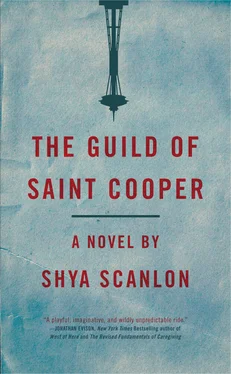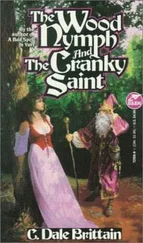“Fly away,” she said, “and be free!”
I STOOD OUTSIDE THE birth house and waited with the rest of them. There were familiar faces, but the crowd was enormous. Hundreds of people had gathered to see the unveiling, and they wandered around, slow and dazed by the heat, coating the neighboring yards like grazing sheep. The scaffolding had been removed, but the shroud itself still covered the house. It had been pulled up and tied in some sort of knot, a rope at the top running down the side of the house and lying coiled in the driveway. Someone stepped on my toe, looked up at me, apologized. He was small, blond, and very fat, and his ragged ZZ Top t-shirt stretched across his protruding gut.
“When the Foo shits,” I said, “wear it.”
“You’re into Confucius?” he asked excitedly.
I stared.
The small man closed his eyes and stiffened his back. “‘The superior man, when resting in safety, does not forget that danger may come. When in a state of security he does not forget the possibility of ruin. When all is orderly, he does not forget that disorder may come. Thus his person is not endangered, and his states and all their clans are preserved.’” He opened his eyes and looked up at me in expectation.
“I thought Confucius was into pith.”
He shook his head, scowling. He’d obviously been through this before. “Confucius is deeply misunderstood.”
I was about to lie, to say that I did indeed understand Confucius, that I was just joking, when the crowd began to murmur and we both turned to see Russell’s white Lexus appear at the corner and slither down the street. As it slowed to a stop, a hush fell over the gathering, and an eerie, worming movement cleared a path from the car door to the house. I was at the halfway point, standing on the sidewalk, and I watched Russell exit the car and turn around, offering his hand to Aya, who climbed out, white as the car, in a long simple gown that made her look like light shining through a keyhole. The pair walked toward the house, and as they passed me Russell winked, mouthing words I couldn’t make out. I nodded.
They climbed onto a small raised platform I hadn’t seen before, and before a crowd even quieter than it had been moments ago, Russell made a speech.
“Cities rarely have the opportunity,” he began, “for rebirth.”
He paused to breathe deeply through his nose.
“To be sure, many try. Buildings, entire blocks, can be rebuilt. Downtowns can undergo what they cynically refer to as ‘urban renewal,’ as though the city were a temporary lease. You can tear down derelict structures, you can repave streets, but no facelift, no new city park can reverse the rot and decay underlying the gradual but inevitable decline. And why is that? Why do you suppose?”
He gave people a moment to consider the question.
“Because a city is not made of bricks and mortar. A city is not a series of streets and telephone poles and sewers and boardwalks and houses and houseflies and lawns and lampposts. Nope. A city, my dear members of the Guild, is people. A city is people, and do you know what that means? That means this city,” and here he pointed out with both hands, waving them rather quickly back and forth, “is you.”
Someone hooted, and a few people hesitantly clapped, uncertain if it was time, if they’d be interrupting, but Russell smiled and nodded.
“Yes,” he said. “Yes! Give yourselves a round of applause. Give Seattle a round of applause!”
In the following din of adoration, Russell stood tall and proud on his pedestal, his hair like white fire, and I could see that whether or not he believed every word he was saying, he was profoundly enjoying this.
“Just yesterday…” he began, then waited for the crowd to come to attention. “Just yesterday I was walking with a friend. This friend expressed something it occurred to me that some of you may still feel. ‘Surely,’ my friend said, ‘the ailments plaguing our Emerald City are global in nature.’ So why take the blame? Why admit fault for something that everyone else is doing wrong too? Why change?
“The answer is simple, and it’s something I think most of you have figured out for yourselves: the city. We do this for the city. The city doesn’t care whose fault something is. The rot does not stop rotting, the decay does not cease its destructive course. In fact, the only thing that changes when we do not take responsibility is that we become overwhelmed by these pernicious powers. We become victims rather than redeemers.”
Russell paused to survey the crowd. Aya, beside him, looked bored, like they’d just come from another venue where he’d given the same speech — true, for all I knew.
“Is that what we want?” he cried.
The crowd waited.
“I said, is that what we want?”
ZZ Top, shaking with energy, shouted, “No!” in a voice cracked by emotion. Taking his lead, the crowd erupted in their own “No,” which because of the delay sounded more like disagreement.
“Of course we don’t. We’re in control of our own destiny. And that means we’re in control of the destiny of Seattle.”
Russell took a step back, reached down for a glass of water someone had been holding for him, and drank it down in three large gulps, streams of it trickling down both sides of his chin and onto his exposed gut. It seemed like a statement. Leader with his Great Thirst. I wondered whether it was scripted.
“When, as a young man, I first met the spiritual descendent of Chief Sealth,” he said, wiping this chin, “when I first met Dale Cooper, I was surprised, astonished to find him looking askance at what I took to be a perfectly healthy city, a robust and alive city peopled with alert, astute, responsible citizens. There we were, recycling fanatics with our vegetable shoes, saving the spotted owl and supporting the service economy — how could he doubt our commitment? How could he question our allegiance?”
Aya now seemed literally to be in pain. Her smile was a thinly veiled grimace, and it was hard to be sure from my angle, but it looked like she was standing slightly bent, slightly crooked.
“But Cooper understood what the people who lived here before us also felt — that the very act of knowing was itself to blame. The false certainty. That once the mystery of our land is lost, once the mystery of our city is lost, once the mystery is sacrificed for the goal of wealth, for the smug and self-satisfied lifestyles to which we’ve grown accustomed, then we too are lost.
“Which is why, dear members of the Guild, this house is such an essential part of Seattle’s imminent rebirth! What could be more mysterious than life itself? What could be more mysterious than the way we come into the world? And that’s why I wanted you all to be a part of it, to assemble and lay your hands upon the house and bring it to life with your stories and your imaginations — your minds! To show the world that mysteries still exist, and that Dale Cooper’s memory and passion and wonder live on.”
He signaled offstage, and I saw the line leading to the top of the house tighten.
“So without further ado, my dears, I give you: the birth house of Special Agent Dale Cooper, Saint of Seattle!”
The cord was pulled taut and loosed a knot, and the shroud fell swiftly, without a snag. The crowd gasped. On top of the abundant and colorful mural, sprawling across the entire thing, were big, black spray-painted letters that read: NEWCOMERS GO HOME .
Russell turned around to take it in himself, and he stood there, motionless, silent, with everyone waiting on his official response. “Newcomers” was the slang Native Americans in the area — people who, in general, had their own take on the city’s evacuation — used for white people. Aya was at this point actually holding her stomach, seemingly entirely distracted from the goings-on. I’d never seen Russell angry, but I was almost certain of what it would look like: the pinkish skin turned red, the large, loaf-like body turned juggernaut, Santa turned Satan. I was almost excited to see it.
Читать дальше












